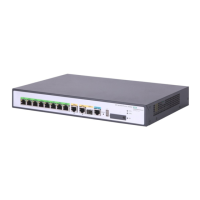272
Views
System view
Predefined user roles
network-admin
Parameters
entity-name: Specifies the name of a PKI entity, a case-insensitive string of 1 to 31 characters.
Usage guidelines
You can configure a variety of attributes for a PKI entity, such as common name, organization,
organization unit, locality, state, country, FQDN, and IP address. When you request a certificate, the PKI
entity information will be used by the CA as the subject contents in the certificate.
Examples
# Create a PKI entity named en and enter its view.
<Sysname> system-view
[Sysname] pki entity en
[Sysname-pki-entity-en]
Related commands
pki domain
pki export
Use pki export to export the CA certificate and the local certificates in a PKI domain to local files or
display them on a terminal.
Syntax
pki export domain domain-name der { all | ca | local } filename filename
pki export domain domain-name p12 { all | local } passphrase p12passwordstring filename filename
pki export domain domain-name pem { { all | local } [ { 3des-cbc | aes-128-cbc | aes-192-cbc |
aes-256-cbc | des-cbc } pempasswordstring ] | ca } [ filename filename ]
Views
System view
Predefined user roles
network-admin
Parameters
domain domain-name: Specifies the name of a PKI domain, a case-insensitive string of 1 to 31 characters.
The domain name cannot contain the following special characters: tilde (~), asterisk (*), backslash (\),
vertical bar (|), colon (:), dot (.), left angle bracket (<), right angle bracket (>), quotation marks ("), and
apostrophe (').
der: Specifies the certificate file format as DER.
p12: Specifies the certificate file format as PKCS12.
pem: Specifies the certificate file format as PEM.

